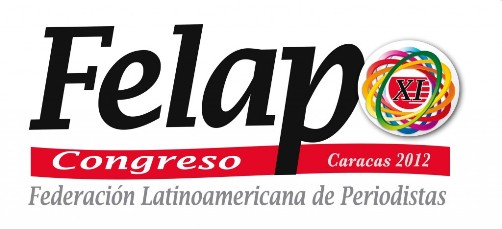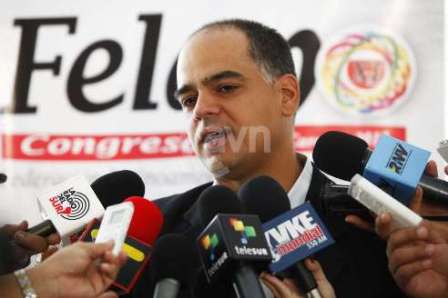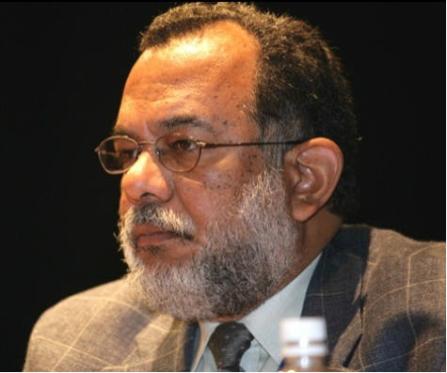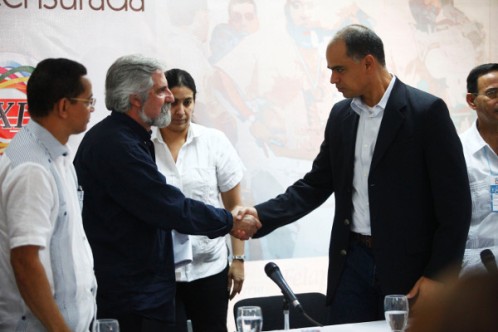
We could not be more pleased to see Venezuela received back into the membership of the Latin-American Confederacy of Journalists (FELAP). Venezuela was expelled by FELAP in 2004 2 years following their participation in the 2002 attempted coup perpetrated against President Chávez and the Venezuelan government. On the first of this month Venezuelan journalists were invited to membership once again after demonstrating their commitment to freedom of expression, fight against tyranny and support for the Bolivarian Revolution during the last decade of the Chávez administration.
In the last decade, we have witnessed the formation of the Union of South American States (UNISUR); the Bolivarian Alliance of the Peoples of Our America (ALBA); the Latin American and Caribbean Community of States (CELAC); the recent entry of Venezuela into Southern Cone Common Market (MERCOSUR); Venezuela's creation of TeleSur, reaching all of South America; the launching of Venezuela's first satellite, "Simon Bolivar" in 2008 and now, the reception of Venezuela into this prestigious community of Latin American media, committed to the truth and journalistic integrity.
Second Venezuelan Satellite: Add to all of the above the launching of "Miranda", Venezuela's second satellite, "Miranda" on the 28th or 29th of this month with 52 Venezuelan scientists working on the project in The Peoples Republic of China. AVN explains that the "Miranda" will help guarantee national security and defense and Science, Technology and Innovation Minister Jorge Arreaza explained the unique media service it will bring to Venezuela:
|
"This innovative free signal will enable interactivity, transmission of high-resolution images and greater access to telecommunications throughout the country, since it will work nationwide. "Interactive qualities of the new digital TV will allow to broadcast real-time news through official information channels and will enable users to monitor meteorological conditions nationwide. "We are setting a precedent with these images of the construction of our Miranda satellite in Beijing, our first scientific research satellite, a satellite for terrestrial observation. |
The prattle of Venezuela's opposition media says that the launching of the Miranda has little importance. Arreaza responds tongue-in-cheek:
|
"Maybe it is not sovereign to have practically real-time information of our territory through the Miranda satellite to take decisions in matters of planning, agriculture, housing, regarding the Grand Housing Mission Venezuela, risk management and to respond to tragedies." |
The importance of FELAP's recognition of the integrity of Venezuelan journalism cannot be overstated. It stands against the myriad and ongoing false accusations that freedom of expression is lacking in the country.The unity brought about by all these Latin American organizations representd a formidable power for overcoming the lies of neoliberalism and the threat of imperialism overtaking the region ever again. The people of Latin America and the world are the beneficiaries.
|
On the first and second days of September, 2012, in Caracas, Republic Bolivariana of Venezuela, the delegates to the XI Congress of the Latin-American Confederacy of Journalists (FELAP), inspired by their fundamental principles, by their four decades of experience in the resistance and by the process of integration of the people of Latin America and the Caribbean in this historic present, expressed their defense of life and against the terrorism of State, the terrorism of market and media terrorism. In that framework, their clear commitment to fight for the truth against the organized lies, has produced -among other decisions of strategic content - the reception of Journalists from Venezuela into the organization of FELAP, not alone in recognition of Venezuelan journalists but also in recognition of the deep process and changes of cultural, political, social, and economic character that produce and prompt the Bolivarian Revolution in all of Latin America and the Caribbean. |
 |
|
“This process of popular democracies that has been going on in Latin America has given the FELAP new air and new force. It’s of great importance that the FELAP celebrate the journalists who have made history in the struggle for freedom of expression and the struggle for the right to popular communication. It is this struggle that has been going on for years and that we are only now starting to see bear fruit.” - Andres Izarra, Minister. |
 |
|
“The great problem that journalists face is that we hold a truth that is spread out while we’re facing a lie that is packaged and delivered very well. "“Those who say there is no freedom of expression in Venezuela don’t only lie but those who exercise their profession in an overwhelming and abusive way many times discredit their very journalistic ethics. They know that in Venezuela there is freedom of press and expression. If not, they wouldn’t be acting that way.” - Nelson del Castillo, |
|
“There are massacres in Mexico, Honduras and Colombia. These are three countries where there is a permanent persecution, threatening, and killing of journalists.” - Juan Carlos Camaño |
 |

President Juan Carlos Camano invites Communication Minister Andres Izarra to bring Venezuelan journalists back into FELAP.
The claims that Venezuela oppresses freedom of expression by the New York Times, Washington Post, Miami Herald, Los Angeles Times, British Broadcasting Corporation, other media corporations and Human Rights Watch will continue. But their deceptions will ring more hollow than ever as the Latin American media strengthen their organization for truth in journalism. The lies of the corporate media about the Venezuelan government are becoming more and more transparent not only in Latin America but among people throughout the world. The Bolivarian Revolution is no longer a Venezuelan phenomenon. It is gradually becoming a path for other nations to free themselves of the chains of U.S. imperialism. MINCI's creation of TeleSur, VTV, ANTV and ViveTV, the launching of 2 satellites, Simon Bolivar and Miranda, covering and informing all of South America - and now their integration with FELAP promises to overthrow the corporate media grip and monoply on information and delivers journalistic integrity to the Southern Hemisphere.
- Les Blough in Venezuela
MINCI (source: Correo del Orinoco-English)
The Latin American Federation of Journalists (FELAP) officially re-accepted Venezuela as a member of its 16-country organization last weekend during the convening of its 11th Congress in the city of Caracas.
A declaration released by the FELAP declared Venezuela’s admittance a
“recognition not only of Venezuelan journalists but also the deep economic, social, political and cultural changes that have been produced and promoted by the Bolivarian Revolution in Latin America and the Caribbean”.
Venezuela had been expelled from the UNESCO affiliated organization in 2004 after members of its National Press Club (CNP) participated in an attempted coup d’etat against democratically elected president, Hugo Chavez, in 2002.
For Communication Minister Andres Izarra, the admission of his country’s Platform of Journalists into the FELAP represents an opportunity for the press federation to take greater advantage of the kind of grassroots media organizations proliferating in Venezuela and around Latin America.
Communication Minister Andres Izarra stated:
“This process of popular democracies that has been going on in Latin America has given the FELAP new air and new force. It’s of great importance that the FELAP celebrate the journalists who have made history in the struggle for freedom of expression and the struggle for the right to popular communication. It is this struggle that has been going on for years and that we are only now starting to see bear fruit.”
In its declaration, made public on Sunday, the FELAP also called for an end to various manifestations of global terrorism including those forms originating in state repression, free-market economics, and the manipulation of mass media.
The declaration drew special attention to the cases of Mexico, Honduras, Paraguay, and Colombia where journalists face increased danger due to “a perverse circle of crime and impunity” organized by mafias and aided by public officials.
“There are massacres in Mexico, Honduras and Colombia. These are three countries where there is a permanent persecution, threatening, and killing of journalists”, FELAP President Juan Carlos Camano said, citing the more than 100 press members who have been murdered in Mexico in the past 12 years.
National and transnational corporations came under additional fire by the group, which denounced “policies that, at the order of controlling interests, manipulate information and communication on a mass scale with the aim of creating the objective and subjective conditions for preserving the interests of the privileged sectors of society”.
According to Nelson del Castillo, Secretary General of the federation, media communication should be carried out by people, not the private sector that owns a majority of outlets.
“The great problem that journalists face is that we hold a truth that is spread out while we’re facing a lie that is packaged and delivered very well”, the Secretary General said.
To fight this, FELAP members resolved to strengthen regional unity and push for a progressive agenda in the multilateral organizations that have arisen in Latin America over the past decade including the Bolivarian Alliance of the Peoples of Our America (ALBA), the Union of South American Nations (Unasur), and the Latin American and Caribbean Community of States (Celac).
Del Castillo also called attention to the ample freedoms that exist in Venezuela and condemned contrary allegations emanating from private media outlets as hypocritical.
“Those who say there is no freedom of expression in Venezuela don’t only lie but those who exercise their profession in an overwhelming and abusive way many times discredit their very journalistic ethics. They know that in Venezuela there is freedom of press and expression. If not, they wouldn’t be acting that way”.
The FELAP was founded in 1976 and includes more than 80,000 affiliated journalists.
Apart from the re-admittance of Venezuela, last weekend’s congress also saw the acceptance of the 105-year old Chilean press group, Journalist's Circle, into the federation.
(translations by Correo del Orinoco and by Axis of Logic)
Sources: MINCI, AVN, Correo del Orinoco